
BONN
If the Paris accord was the spark igniting the global fight against climate change, then the latest round of talks, held in Bonn, served to fan the flames.
These were not talks intending to deliver bombshell moments for the 10,000 government delegates, 8,000 business and policy leaders or the 2,000 members of the media who gathered near the Rhine. The talks aimed to tighten the bolts on the Paris Agreement to drive momentum behind the global climate juggernaut. It has been two years since 194 countries agreed to limit global warming to less than 2C above the Earth’s pre-industrial average.
In an act of almost audacious ambition, the Paris accord aims to keep temperatures within 1.5C by reducing net carbon emissions to zero.
But this was two years ago. Since then the US, the world’s second greatest polluter, elected Donald Trump as president on the back of soaring campaign rhetoric over a coal renaissance for the forgotten pockets of the States.
Trump duly followed through on threats to withdraw from the accord, pull research funding for the Intergovernmental Panel on Climate Change (IPCC) and loosen federal regulation on coal use. But in an intriguing diplomatic twist Trump’s unilateral U-turn has proved to be the kindling for a fired-up climate agenda. Christiana Figueres, the UN’s chief climate negotiator, went as far as to say she thanks him. “Trump’s announcement provoked an unparalleled wave of support for the treaty. He shored up the world’s resolve on climate action, and for that we can all be grateful,” she said.
The eagerness to stand against Trump’s backslide into high-carbon fossil fuels is more than political posturing, although there was plenty to be seen in Bonn. The stance in favour of a low-carbon future is increasingly backed by business.
Tom Delay, once an executive at Royal Dutch Shell, is now the chief executive of the Carbon Trust, a major UK climate advisory group. “This is not about taking the moral high ground. There’s very little ‘morality’ in what is being argued. Quite simply, there’s now a business case to do something different and do it better,” he says.
Opposition to Trump was perhaps fiercest from with his own country. Billionaire businessman Michael Bloomberg is leading the charge, delivering a staggering broadside against the president via a climate action report, billed as the “first communication to the international community” of US climate goals, on a non-federal level, since Trump’s rejection of the Paris Agreement. Bloomberg calls it the American Pledge, neatly reclaiming a commitment to tackling climate change as a national endeavour while alienating Trump as somehow “un-American” in this context.
In an embarrassing rebuke to Trump’s vow to cut funding for the IPCC research group, French President Emmanual Macron told delegates of the Bonn conference that France would ensure the US’ $2 million (Dh7.35 million) annual funding would be covered. “I hope Europe can replace the US as a climate leader and I can tell you that France is ready for that,” he said.
Bonn has proved that a lot can happen in a year.
— The Telegraph Group Limited, London 2017













